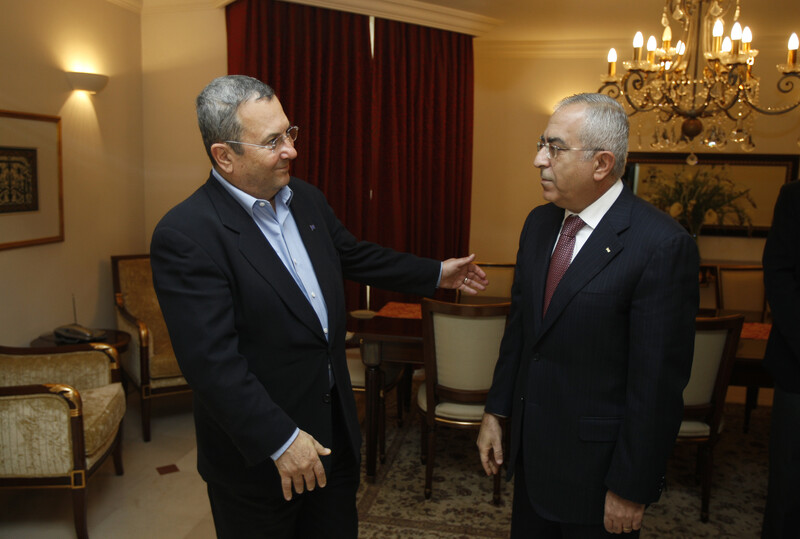Activism and BDS Beat 26 April 2023

Both former Israeli Prime Minster Ehud Barak and former unelected Palestinian Prime Minister Salam Fayyad are scheduled to speak at an Israel propaganda conference in Texas.
UPIEhud Barak, an Israeli political leader who oversaw the first in a series of major attacks on Gaza, is scheduled to appear in Texas this week.
A broad coalition of students, faculty and activists in Houston are calling for the cancellation of an event at Rice University featuring Barak and other war crimes suspects.
The conference, billed as “Israel at 75,” tacitly celebrates how Israel was founded through the mass expulsion of Palestinians.
It is being hosted by the Baker Institute for Public Policy, an on-campus think tank founded by James Baker, the former secretary of state under the Ronald Reagan administration and, later, chief of staff to George H.W. Bush.
“As the Palestinian people continue to fight against Israel’s brutality, Rice University’s Baker Institute is platforming major Israeli war criminals … whose political careers are defined by bombings on Gaza, mass imprisonment of youth and the state-sanctioned murder of Palestinians,” the groups state.
Students for Justice in Palestine (SJP) chapters at Rice University and the University of Houston are hosting a rally on campus during the conference.Along with SJP, local chapters of Jewish Voice for Peace and the Palestinian Youth Movement have launched a petition demanding that officials of the Baker Institute immediately cancel the conference and release a statement “reaffirming the university’s commitment to diversity, equity and inclusion by supporting Palestinian academic and organizing initiatives on campus and in Houston more broadly.”
The petition states a broad rejection of Rice University’s “condonation of Israel’s colonization and brutalization of Palestine and its resilient people in our name.” It affirms, too, “our unrelenting support for Palestinian liberation and self-determination.”
Among the “Israel at 75” speakers are former Israeli Prime Minister Ehud Barak.
As defense minister, he oversaw Operation Cast Lead. Undertaken in late 2008 and early 2009, it was the first in a series of major offensives against Gaza, during which civilian infrastructure was repeatedly bombarded and civilians were repeatedly massacred.
In 2010, Barak then greenlit the lethal attack by Israeli commandos on an international aid flotilla.
Isaac Herzog, Israel’s president and once a top officer in the spy agency Unit 8200 who has not only supported military attacks on Gaza and the West Bank but also Israel’s expulsion of African asylum seekers, is another speaker.
His brother Michael Herzog, the Israeli ambassador to the US, was initially scheduled to speak at the event but his name has been taken off of the current billing.
Michael Herzog, a retired brigadier general, is also suspected of war crimes. In January 2009, Spain’s national court decided to open an investigation into Herzog and six other Israeli political and military figures over their involvement in the 2002 bombing of a residential area in Gaza.
He would have been in conversation with Salam Fayyad, the Palestinian Authority’s former – and unelected – prime minister who accelerated neoliberal economic and political cooperation with the Israelis and their American collaborators.
Fayyad is still on the ticket, and is planning to speak about the so-called two-state solution during an afternoon panel.
A moment to build movements
Human rights supporters say that these kinds of attempts to whitewash 75 years of relentless colonial violence are acts of desperation as global consciousness continues to build in support of Palestine liberation.
“We have to look at these ‘Israel at 75’ events as the Zionist movement scrambling in the US to maintain face,” Fouad Kirreh of the Palestinian Youth Movement in Houston told The Electronic Intifada.
“The accusations of terrorism against us didn’t work, the anti-Palestinian racism and Islamophobia didn’t work, aligning themselves with the social justice movement didn’t work – the facade of Zionism, the thin veil that Zionism seeks to hide itself behind, is really coming off.”
He explained that the anger that students feel over the Rice University conference is helping strengthen the movement for Palestinian rights.
Now, he added, “is the moment to agitate against these contradictions. When we see these events popping up – these events may have large funders and show the big donors in your cities attending – we have a really robust and interconnected power of the people that we can use to challenge these events, to make our cities red lines for Palestine.”
Organizing against the event “has highlighted that the struggle against the glorification of Zionism – on any campus – transcends that specific university, and becomes a communal and city-wide issue,” Kirreh said.
“As Rice University platforms the former prime minister and military strategists of Israel, who are complicit in the arrest and murder of millions of our people back home, that has to be translated into a long-term strategic approach to combating Zionism in our locales,” he added.
Although highlighting widespread opposition to the conference at Rice University is an immediate priority, it has been a way to strengthen coalition-building across US campuses, Anna Rajagopal of Rice University SJP told The Electronic Intifada.
“Students are getting angry; people in Houston, the broader community, are getting angry. I think there’s a lot of anger and outrage that this is actually happening and that the [event] is going through,” she said.
“This is a moment that is building a movement in Houston more broadly, and it’s everyone taking a stand and saying these aren’t people who we want representing us in our own city.”





